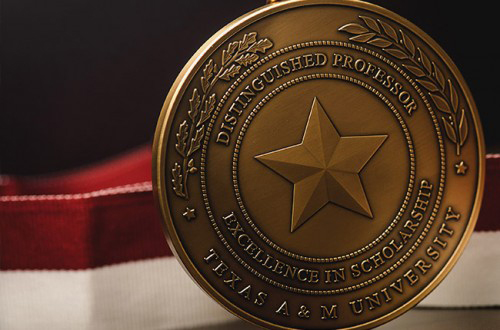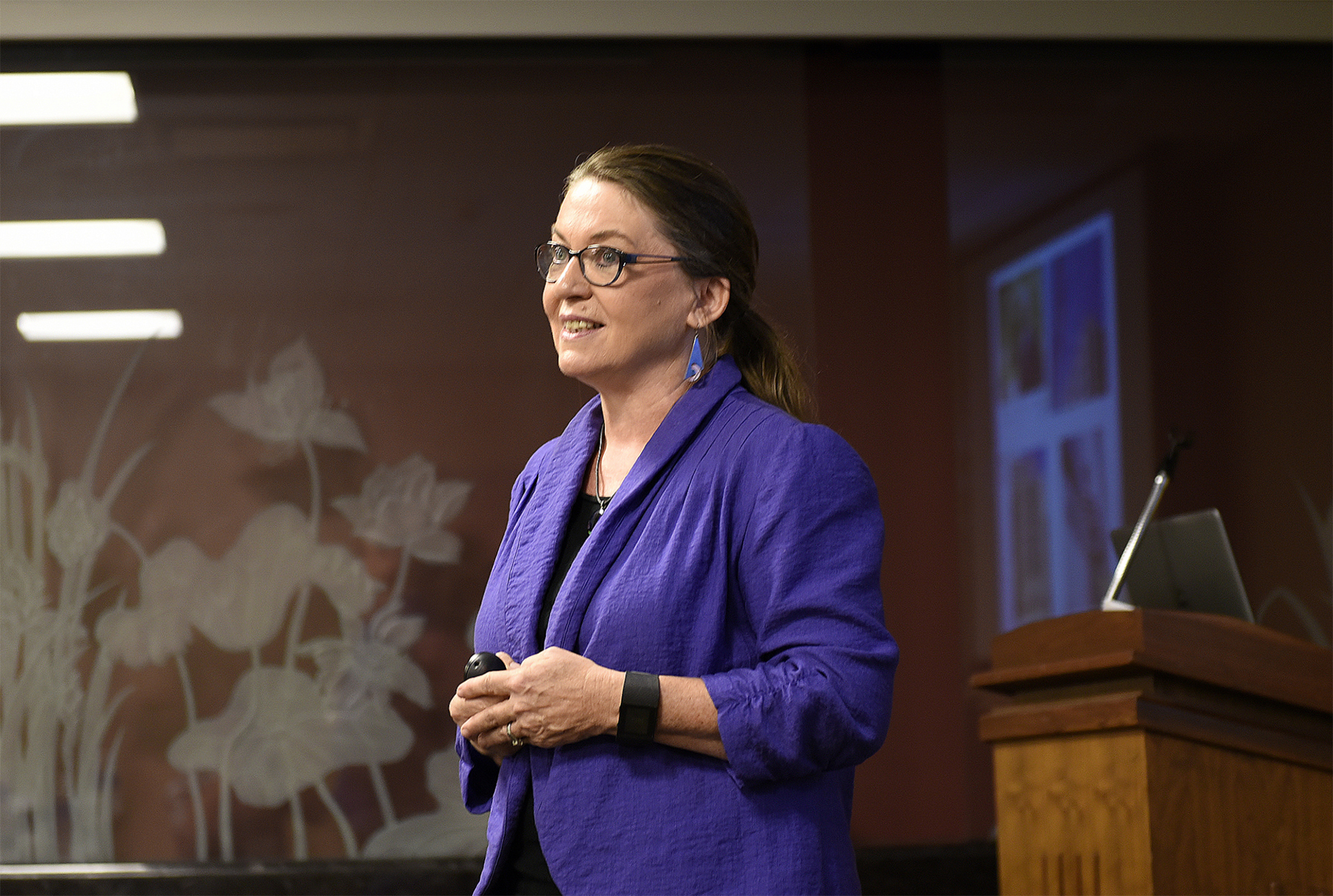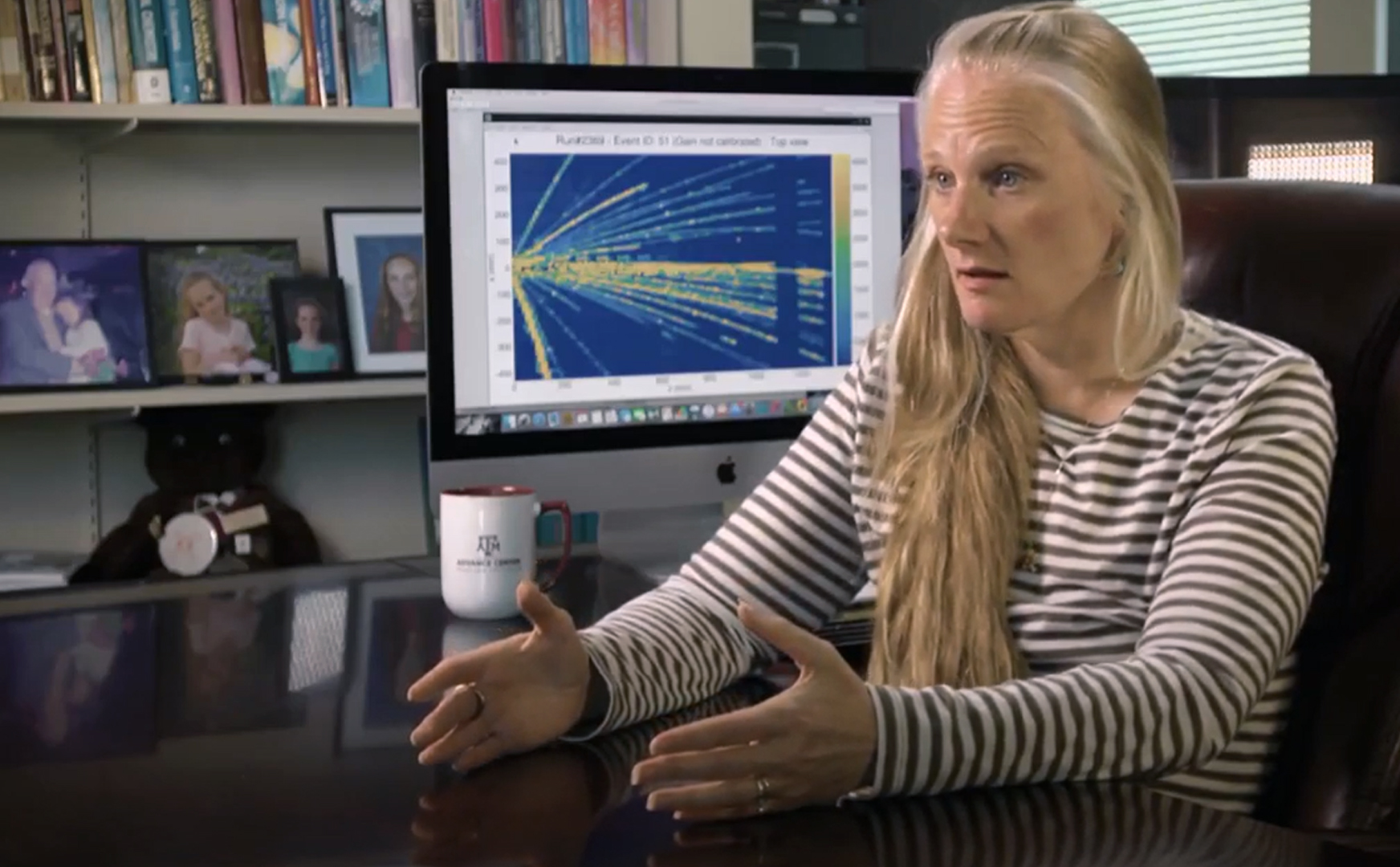
Two College of Arts and Sciences faculty are among the eight Texas A&M University faculty appointed to the rank of University Distinguished Professor, effective September 1, 2023.
Deborah Bell-Pedersen, Terry Thomas University Professor of Biology, and Sherry J. Yennello, Regents Professor of Chemistry, have been recognized along with Perla Beatriz Balbuena, professor in the Artie McFerrin Department of Chemical Engineering within the College of Engineering (who also holds a joint appointment in the Department of Chemistry); Roderick H. Dashwood, professor in the Department of Translational Medical Sciences within the School of Medicine; James Hubbard Jr., professor in the J. Mike Walker ’66 Department of Mechanical Engineering within the College of Engineering; Huyen Pham, professor within the School of Law; Efstratios N. Pistikopoulos, professor in the Artie McFerrin Department of Chemical Engineering within the College of Engineering; and Virender K. Sharma, professor in the Department of Environmental and Occupational Health within the School of Public Health, who were announced Monday (Feb. 13) as the latest recipients of the coveted title.
Bell-Pedersen, a member of the Department of Biology since 1997 and director of the Center for Biological Clocks Research, is an internationally recognized leader in the fields of circadian and fungal biology and an expert in the mechanisms underpinning the biology of cellular clocks. For the past three decades, her research has focused on molecular studies of the circadian biological clock in Neurospora crassa, a filamentous fungus that has been used as a model organism for research since the 1940s. In addition to being involved in sequencing and annotating the Neurospora genome, she created the first DNA chips containing the fungus’s genes that led to major insights into its biological clock, such as how it generates and controls daily rhythms in protein production — processes which are critical to human health and drug metabolism.
“As a graduate student in the early 2000s, I learned of Deb's work on circadian rhythms, and her contributions have grown over time,” said Alex C. Keene, professor and head of Texas A&M Biology. “Deb's work elucidating how cells alter the levels of proteins between day and night has significantly impacted our understanding of several fundamental areas of biology and medicine, and that impact is recognized internationally and across numerous disciplines of science. Being her colleague at Texas A&M is a privilege, and her accomplishments are worthy of this recognition.”
Yennello, who joined the Department of Chemistry faculty in 1993 and holds the Bright Chair in Nuclear Science, is an internationally renowned nuclear chemist and expert in heavy-ion reactions whose research significantly influences our understanding of the forces shaping our universe and how the elements are made in stars. She has served since 2014 as director of Texas A&M’s world-class Cyclotron Institute, where, through her research focusing on the nuclear equation-of-state and heavy-ion reactions, she has made transformational contributions to our understanding of nuclear reactions induced by radioactive nuclei along with the properties of neutron-rich matter. She is a global authority in the use of isotopically selected beams to explore the dynamics and thermodynamics of nuclear collisions — including one of the first-ever experiments induced by a radioactive beam — and, more recently, to produce medically relevant isotopes.
“Professor Sherry Yennello is preeminent in the field of nuclear chemistry,” said Simon W. North, John W. Bevan Professor of Chemistry and head of Texas A&M Chemistry. “Her work has produced extraordinary, game-changing new paradigms described as ‘textbook quality.’ She is credited with the first experiment to study the dynamics of nuclear reactions using a radioactive beam and leading to innovative and illuminating research on the role of the N/Z degree of freedom on dynamics and equilibration in nuclear reactions. These transformational advances could not even have been dreamed about 30 years ago and have spawned new research activity in other laboratories.”
The 2023 University Distinguished Professor honorees join a select group of more than 100 current faculty members who hold the prestigious title — one bestowed in perpetuity that identifies faculty members who are preeminent in their fields and have made at least one landmark contribution to their disciplines. Their work is considered central to any narrative of the field and widely recognized to have changed its direction of scholarship. Past recipients of the lifetime title participate in the selection process, growing the ranks of distinguished professors by just a handful of scholars each year.

Bell-Pedersen earned her Ph.D. in molecular biology at the State University of New York at Albany in 1991 and completed postdoctoral work at Dartmouth Medical School prior to coming to Texas A&M, where she previously served as associate head for research within the Department of Biology. Her research continues to investigate how the circadian clock regulates daily rhythms in mRNA and protein levels, paving the way for improvements in human health and in treating circadian disorders. Her work has been continuously funded by a variety of federal, state and private sources, including a current National Institutes of Health (NIH) Maximizing Investigators' Research Award (MIRA) through the National Institute of General Medical Studies.
A fellow of the American Academy of Microbiology (2014) and the American Association for the Advancement of Science (2021), Bell-Pedersen has been a member of the NIH Cellular Signaling and Regulatory Systems Study Section and served on numerous other review panels for the NIH, National Science Foundation and NASA as well as the editorial boards for many premier life sciences journals, including Eukaryotic Cell. Her many career honors in addition to being named one of five inaugural holders of Texas A&M’s University Professorship in 2019 include a 2015 Texas A&M Association of Former Students Distinguished Achievement Award for Research, the 2013 Texas A&M Women Former Students’ Network Eminent Scholar Award, a 2010 Sigma Xi Distinguished Lectureship and 2010 University Distinguished Lectureship at Texas A&M, the 2010 Davidson Award from Baylor University, the 2010 Ethel Ashworth-Tsutsui Memorial Lectureship at Texas A&M, a 2007 Texas A&M Association of Former Students College-Level Distinguished Achievement Award in Teaching and the 2005 JoAnn Treat Research Excellence Award.

Yennello earned her Ph.D. in nuclear chemistry from Indiana University in 1990 and spent two years as a postdoctoral fellow at Michigan State University prior to coming to Texas A&M, where she is principal investigator for two U.S. Department of Energy-funded Centers of Excellence: an $11.7 million Cyclotron Institute-based nuclear science center and a $10 million, six-institution Center for Excellence in Nuclear Training And University-based Research (CENTAUR). She also leads a $2 million DOE-funded isotope traineeship coordination site, the Horizon-broadening Isotope Production Pipeline Opportunities (HIPPO) program. For more than a decade, Yennello was an associate dean in the former College of Science with oversight for various areas ranging from diversity and college climate to faculty affairs and strategic initiatives. At Texas A&M and across the world, she is well-known and widely respected as an instructor, research scientist, administrator, mentor and advocate for faculty and students, particularly women and minorities in STEM.
A University Faculty Fellow, Yennello is a fellow of the American Association for the Advancement of Science (2012), the American Chemical Society (2011) and the American Physical Society (2005). Her many awards include the ACS’s Glenn T. Seaborg Award for Nuclear Chemistry (2021) and Francis P. Garvan-John M. Olin Medal (2011), the Texas A&M Association of Former Students Distinguished Achievement Award for Administration (2019), the APS Division of Nuclear Physics Mentoring Award (2017), the Texas A&M Women’s Faculty Network Outstanding Mentor Award (2010), the Texas A&M Association of Former Students Distinguished Achievement Award in Teaching at both the university and college levels (2012 and 2008, respectively), the Sigma Xi National Young Investigator Award (2000), the NSF Young Investigator Award (1994), the Oak Ridge Junior Faculty Enhancement Award (1993) and the General Electric Faculty for the Future Award (1993).
Learn more about faculty excellence in the College of Arts and Sciences.

